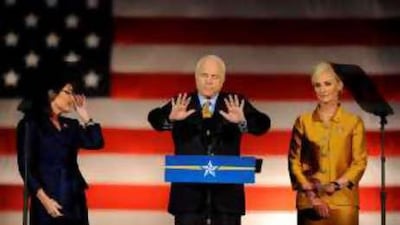Phoenix // Some say John McCain had the decks stacked against him. Others say he ran an erratic campaign. Many believe the Republican Party has simply lost touch with moderate Americans. A day after Barack Obama and the Democratic Party gave the Republicans an ample drubbing, winning the White House and majorities in both houses of Congress, Republicans were picking up the pieces, trying to figure out what went wrong and where to go from here. Colin Powell, the former US secretary of state, who earlier chastised his fellow Republicans for playing the race and religion card, told CNN he believed it was time for "deep introspection on the part of the Republican Party". Mr Powell had criticised Republican efforts to portray Mr Obama, whose middle name is Hussein, as a Muslim, saying a candidate's faith should not matter. Mr Obama is a Christian, although his estranged father was Muslim. On Wednesday, Mr Powell called on Republicans to "see where we went wrong, why we aren't attaching ourselves to the hopes, dreams and ambitions of the American people". Race played a critical if often unspoken role in the campaign. Mr McCain's rallies tended to gather monochromatic crowds of white faces, many of them older. Mr Obama, the son of a white mother and a black Kenyan father, brought out record numbers of black and Hispanic voters, also invigorating young Americans with his message of unity and change. "The McCain campaign tried race-baiting tactics - casting Mr Obama as foreign and dangerous," said Clifford Schecter, a McCain biographer. "By taking positions that were so extreme, they lost the rest of the country, which is closer to the centre." Political scientists said the ordinarily moderate Mr McCain had pandered too heavily to the religious right, reversing his earlier positions on ethical issues such as abortion and choosing Sarah Palin, a Pentecostal Christian, as his running mate. "He did not tap into moderates as well as Obama did," said Fred Solop, who chairs the political affairs department at Northern Arizona University. After Mr McCain delivered an eloquent concession speech on Tuesday, congratulating Mr Obama on becoming the country's first African-American president and calling on Republicans to rally behind the new leader, many listeners remarked that he should have found that reasoned voice sooner. "Had he been that way the whole time, we might have had a different ending," said Helen Rees, a volunteer for the Obama campaign. It would have been difficult for any Republican with nine out of 10 Americans thinking the country is heading in the wrong direction under George W Bush. Yet compared to Mr Obama's tightly focused message, analysts said Mr McCain ran a discombobulated campaign, at once trying to distance himself from Mr Bush while also trying to appeal to the Republican base. "Personally, I think he ran a terrible race," said Bruce Merrill, a former Republican strategist who has run dozens of campaigns. "They were always chasing sound-bites, but there was no clear focus." Whereas Mr Obama consistently identified Mr McCain with the failed economic policies of the Bush administration, Mr McCain himself appeared erratic when the financial crisis erupted. He first suspended his campaign, allegedly to race to Washington to find a solution, and then postponed the trip almost 24 hours to do a TV interview and attend a fundraiser. His choice of Mrs Palin as running mate at first invigorated the ticket, briefly pushing the Republicans into the lead. But later her lack of experience and poor performance in interviews turned off many voters, who wanted someone more seasoned a heartbeat away from the presidency. "If Palin is the future star it will be the death of the Republican Party," Mr Merrill said. "It will more and more isolate the party." Major players in the party will reportedly meet in the coming week in Virginia to hash out plans to send the Republicans in a new direction. "We have got to clean up, reform and rebuild the Republican Party before we can ask Americans to trust us again," said Jim DeMint, a South Carolina senator. "This must begin with either a change of command at the highest levels or our current leaders must embrace a bold new direction." Mr McCain faces the end of the road. At 72, he will not be able to mount another presidential campaign, and now returns to Washington to serve out his term as senator. gpeters@thenational.ae For full election coverage, visit www.thenational.ae/uselections

Looking back at what went wrong
Criticism abounds from within the party after the beathing it took at the polls as senior figures call for embracing a 'bold new direction'.
Most popular today
